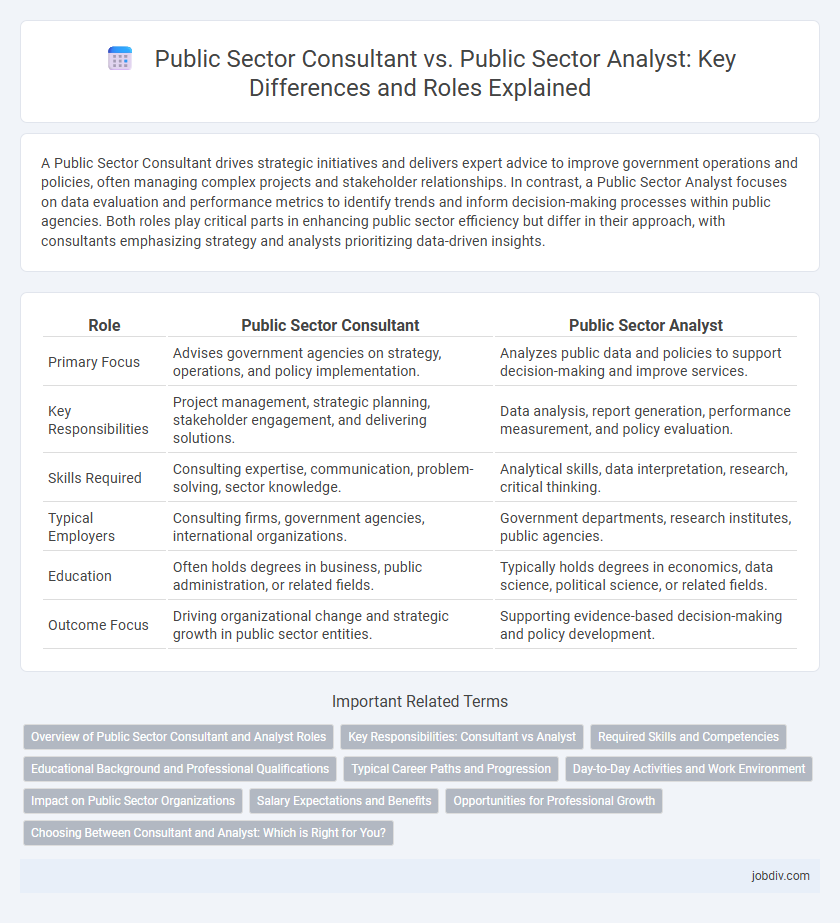A Public Sector Consultant drives strategic initiatives and delivers expert advice to improve government operations and policies, often managing complex projects and stakeholder relationships. In contrast, a Public Sector Analyst focuses on data evaluation and performance metrics to identify trends and inform decision-making processes within public agencies. Both roles play critical parts in enhancing public sector efficiency but differ in their approach, with consultants emphasizing strategy and analysts prioritizing data-driven insights.
Table of Comparison
| Role | Public Sector Consultant | Public Sector Analyst |
|---|---|---|
| Primary Focus | Advises government agencies on strategy, operations, and policy implementation. | Analyzes public data and policies to support decision-making and improve services. |
| Key Responsibilities | Project management, strategic planning, stakeholder engagement, and delivering solutions. | Data analysis, report generation, performance measurement, and policy evaluation. |
| Skills Required | Consulting expertise, communication, problem-solving, sector knowledge. | Analytical skills, data interpretation, research, critical thinking. |
| Typical Employers | Consulting firms, government agencies, international organizations. | Government departments, research institutes, public agencies. |
| Education | Often holds degrees in business, public administration, or related fields. | Typically holds degrees in economics, data science, political science, or related fields. |
| Outcome Focus | Driving organizational change and strategic growth in public sector entities. | Supporting evidence-based decision-making and policy development. |
Overview of Public Sector Consultant and Analyst Roles
Public Sector Consultants provide strategic advice and implement solutions to improve government operations and policy effectiveness. Public Sector Analysts focus on data collection, evaluation, and reporting to support decision-making and optimize public programs. Both roles require strong analytical skills but differ in scope, with consultants emphasizing strategy and implementation while analysts concentrate on data-driven insights.
Key Responsibilities: Consultant vs Analyst
Public Sector Consultants primarily focus on advising government agencies on strategy development, policy implementation, and organizational improvements to enhance public service delivery. Public Sector Analysts concentrate on data collection, performance evaluation, and trend analysis to inform decision-making and policy formulation. Consultants drive high-level project management and stakeholder engagement, while Analysts specialize in research and reporting to support evidence-based recommendations.
Required Skills and Competencies
Public Sector Consultants require strong project management, strategic planning, and stakeholder engagement skills to drive large-scale government initiatives effectively. Public Sector Analysts must excel in data analysis, policy evaluation, and critical thinking to assess program outcomes and inform decision-making. Both roles demand proficiency in government regulations, communication, and problem-solving, but consultants emphasize advisory capabilities while analysts focus on quantitative insights.
Educational Background and Professional Qualifications
Public Sector Consultants typically possess advanced degrees such as a Master's in Public Administration, Business Administration, or specialized fields like public policy, supported by certifications like PMP or Six Sigma to enhance project management skills. Public Sector Analysts often hold bachelor's degrees in economics, political science, or statistics, and may pursue professional qualifications such as Certified Government Financial Manager (CGFM) or data analysis certifications. Both roles require strong analytical and communication skills, but Consultants emphasize strategic advising with broader management credentials, while Analysts focus on data-driven insights supported by quantitative expertise.
Typical Career Paths and Progression
Public Sector Consultants often progress by specializing in strategic advisory roles, moving from junior consultant positions to senior consultant and project management roles, eventually advancing to partner or director levels within consulting firms or government agencies. Public Sector Analysts typically start as entry-level analysts focused on data collection and policy evaluation before advancing to senior analyst positions, policy advisor roles, and potentially managerial or director-level roles in government departments or public institutions. Career growth for consultants centers around client engagement and strategic impact, while analysts focus on deepening expertise in data-driven policy development and operational efficiency.
Day-to-Day Activities and Work Environment
Public Sector Consultants primarily engage in strategic planning, policy development, and stakeholder engagement, often working on diverse projects across government agencies to improve efficiency and implement reforms. Public Sector Analysts focus on data collection, performance evaluation, and reporting, providing detailed insights that inform decision-making within specific departments. Consultants typically experience varied work environments including client sites and collaborative meetings, while Analysts often operate within government offices handling extensive data analysis.
Impact on Public Sector Organizations
Public Sector Consultants drive strategic transformation in government agencies by offering tailored solutions that enhance operational efficiency and policy implementation. Public Sector Analysts focus on data collection and interpretation to inform evidence-based decision-making and improve public service delivery. Both roles significantly impact public sector organizations by optimizing resource allocation and increasing accountability.
Salary Expectations and Benefits
Public Sector Consultants typically command higher salary expectations than Public Sector Analysts, with average annual earnings ranging from $80,000 to $120,000 compared to $60,000 to $90,000 for analysts. Consultants often receive enhanced benefits packages including performance bonuses, project-based incentives, and professional development opportunities. Analysts benefit from more structured government employee benefits such as pension plans, health insurance, and job security within public institutions.
Opportunities for Professional Growth
Public Sector Consultants often experience rapid career advancement through project-based roles that develop strategic planning and change management skills, positioning them for leadership or advisory positions. Public Sector Analysts build deep expertise in data analysis, policy evaluation, and performance measurement, creating pathways to specialized roles in research, program management, or executive decision support. Both roles offer unique opportunities for professional growth, with Consultants gaining broad organizational insight and Analysts honing critical analytical competencies essential for public sector innovation.
Choosing Between Consultant and Analyst: Which is Right for You?
Choosing between a Public Sector Consultant and a Public Sector Analyst depends on your career goals and skill set; consultants typically focus on strategic advisory roles, project management, and stakeholder engagement, while analysts emphasize data interpretation, policy evaluation, and operational improvements. Consultants often require strong communication and leadership skills to influence organizational change, whereas analysts need expertise in data analysis, research methodologies, and technical tools. Assess your preference for hands-on advisory responsibilities versus in-depth analytical tasks to determine the best fit for your professional development in the public sector.
Public Sector Consultant vs Public Sector Analyst Infographic

 jobdiv.com
jobdiv.com